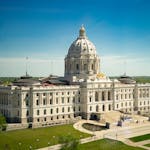My father served 20 years in the U.S. Navy. He was a "90-day wonder," one of the men who were juniors and seniors in college when Pearl Harbor happened and volunteered for an intensive, three-month program that granted them both a degree and a commission. He began World War II on patrol boats looking for German submarines off the South Florida coast and finished it as the executive officer on a destroyer in the South Pacific.
He stayed in the Navy after the war, specializing in the then-fledgling field of public relations. He was the first commanding officer of the Navy's Journalism School in Great Lakes, then served as Navy press liaison in the U.S. Embassy in London. There, among other things, he helped with the production of "Victory at Sea," a popular TV series about the Navy's WWII endeavors. He met director John Ford and persuaded Clark Gable to visit my mother when she was in the hospital after giving birth to one of my brothers.
He came back to join Adm. Arleigh Burke's staff in the Chief of Naval Operations office. When Burke retired after six years as CNO, my father was assigned to a small department to wait out the remainder of his enlistment. He looked around for projects.
One of them was to promote the "Sea Chanters," a choral group at the Naval Academy that was part of the Navy Band. He pulled together various resources and, in 1959, produced a recording of the group singing classic sea chanties. In early 1960, the Sea Chanters accompanied President Dwight Eisenhower on a trip to Brazil and were asked to perform at the U.S. Embassy in Rio de Janeiro. Their plane collided with another aircraft and 19 members of the group died.
Veterans Day is full of both legitimate praise for sacrifice and embarrassing BS. I served four years on ammunition ships during the Vietnam era. Most of the time it was routine work that often seemed a colossal waste of time and money. We actively ignored any idea that what we were doing could sometimes be dangerous and, if not done correctly, potentially catastrophic. But none of us thought of ourselves as heroes.
It's a different world now. Some veterans deserve the accolades lavished on them as we roll out enormous flags at football games. Some were, in deed and fact, heroes. But most of us weren't. Relatively few of us ever were in combat. We just did what we thought was our duty with more or less commitment to the grand ideals we thought America stood for.
My suggestion: On Veterans Day, don't buy into the idea that every veteran was a Rambo or a Top Gun. Don't succumb to blind patriotism. Don't accept that America is perfect or ever has been. Realize that when you sing "God Bless America," we really do need to be guided "through the night with a light from above."
But by all means pause and think about the men and women who have served — all of them. The heroes and the grunts, the givers and the takers, those on the front lines and those who support them.
And maybe remember the choristers who sang "What Can You Do with a Drunken Sailor" and died in an accident for the privilege to do so.
Doug Wilhide is a writer in Minneapolis.





